Key takeaways:
- A communication framework enhances clarity and understanding in conversations, adapting to various contexts for effective interaction.
- Research tools, both digital and offline, are essential for organizing information, gaining insights, and fostering collaboration in communication studies.
- Qualitative and quantitative tools provide unique perspectives that can uncover deeper understanding, influencing research outcomes significantly.
- Engaging with experts on social media can yield fresh insights and opportunities for innovative discussions in the field of communication.
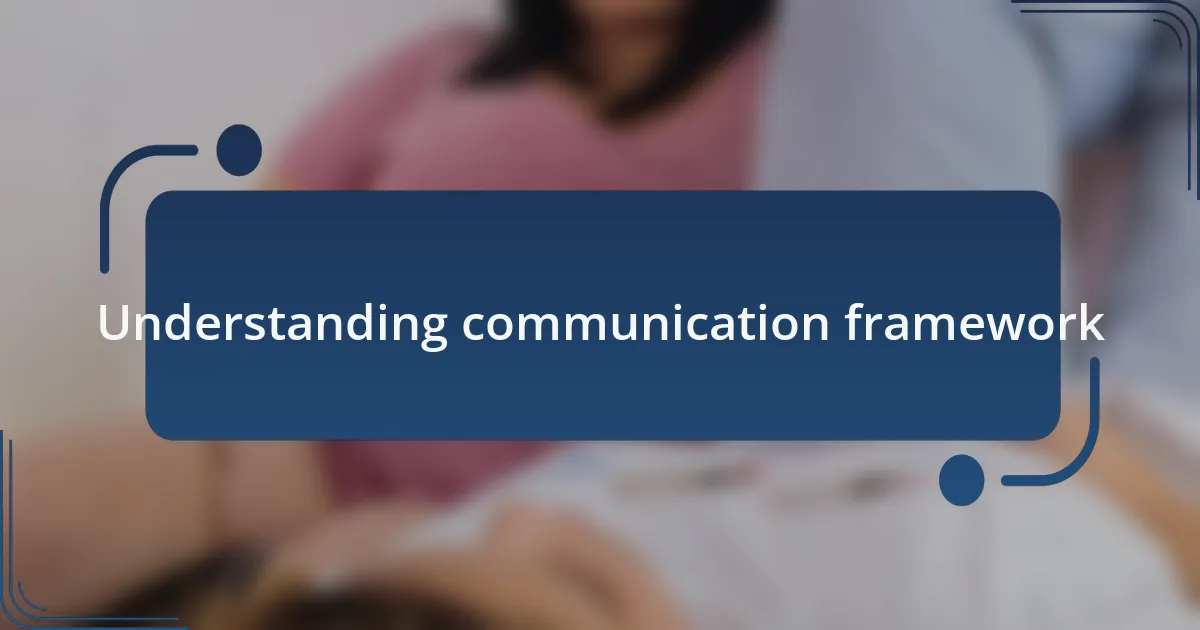
Understanding communication framework
A communication framework serves as a blueprint for how we share information, allowing us to navigate conversations more effectively. I remember a project where clarity was crucial; without a structured approach, misunderstandings could easily have derailed our goals. Have you ever felt lost in a conversation? A solid framework can steer the dialogue back on course.
When I delve into communication theories, I often reflect on how they apply in real-life scenarios. For instance, understanding the difference between verbal and non-verbal cues dramatically shifted the way I interact with my colleagues. I once misread a teammate’s crossed arms as defensiveness, only to discover later that they were simply cold. How often do we let assumptions cloud our communication?
In essence, the depth of a communication framework lies in its ability to adapt to various contexts. Personally, I find that applying frameworks like active listening not only enriches my interactions but also fosters deeper connections. Could it be that the key to successful dialogue resides in our ability to truly hear and understand each other?
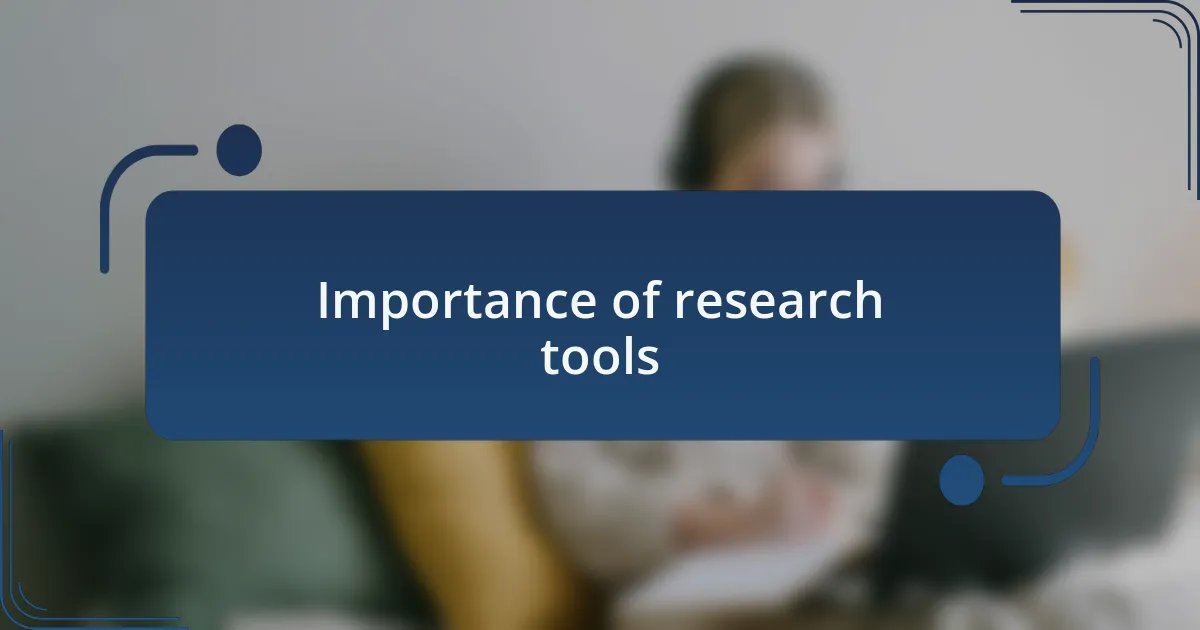
Importance of research tools
Research tools are essential in shaping our understanding of any subject, especially communication frameworks. When I started exploring various communication models, I often encountered a flood of information. The right tools helped me filter out the noise, allowing me to focus on what truly mattered. Isn’t it refreshing to have a clear direction in a sea of data?
I remember navigating a particularly complex project where I relied heavily on specific analytical tools to delve into audience responses. These insights transformed my approach, illuminating aspects of communication that I had previously overlooked. It made me question: how much could we discover if we harness the full potential of the right research tools?
Moreover, using diverse research tools empowers me to view communication from multiple angles. Each tool offers a unique perspective, enhancing my ability to adapt strategies effectively. Have you ever felt invigorated by a fresh insight? That spark of understanding can only emerge when you leverage the right resources.
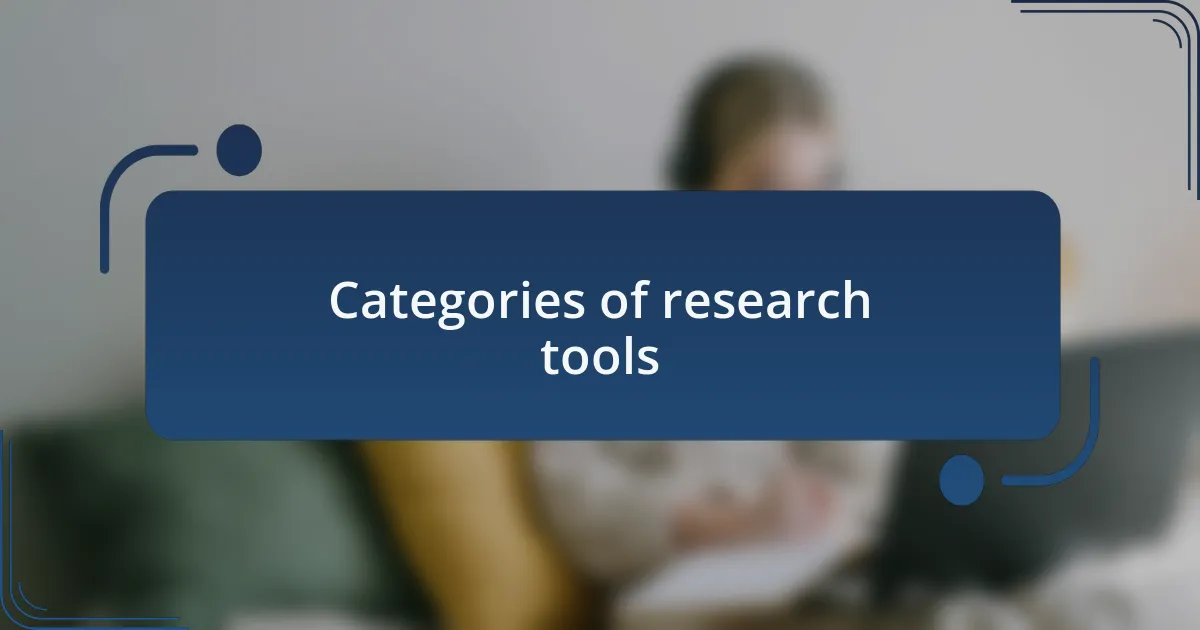
Categories of research tools
Research tools can generally be classified into several categories, each serving unique purposes in the process of gathering and analyzing information. For instance, I often rely on qualitative tools, like surveys and interviews, which provide rich, descriptive insights into people’s thoughts and feelings about communication. I still remember a time when I conducted a series of interviews; those conversations opened my eyes to nuances in perception that numbers alone couldn’t capture. Have you had any enlightening discussions that changed your viewpoint?
On the quantitative side, I find statistical analysis tools invaluable for making sense of larger data sets. When I first used software like SPSS, it revolutionized how I processed information. I was amazed at how much clarity it brought to my analyses, turning chaos into coherent patterns. Who knew numbers could tell such compelling stories?
Lastly, I can’t overlook the role of content analysis tools, which let me dig deeper into existing literature and media. I once stumbled upon insights through a content analysis tool that revealed trends in communication styles across platforms. This experience reinforced the idea that the right tools can unveil layers of complexity in any research topic, wouldn’t you agree?
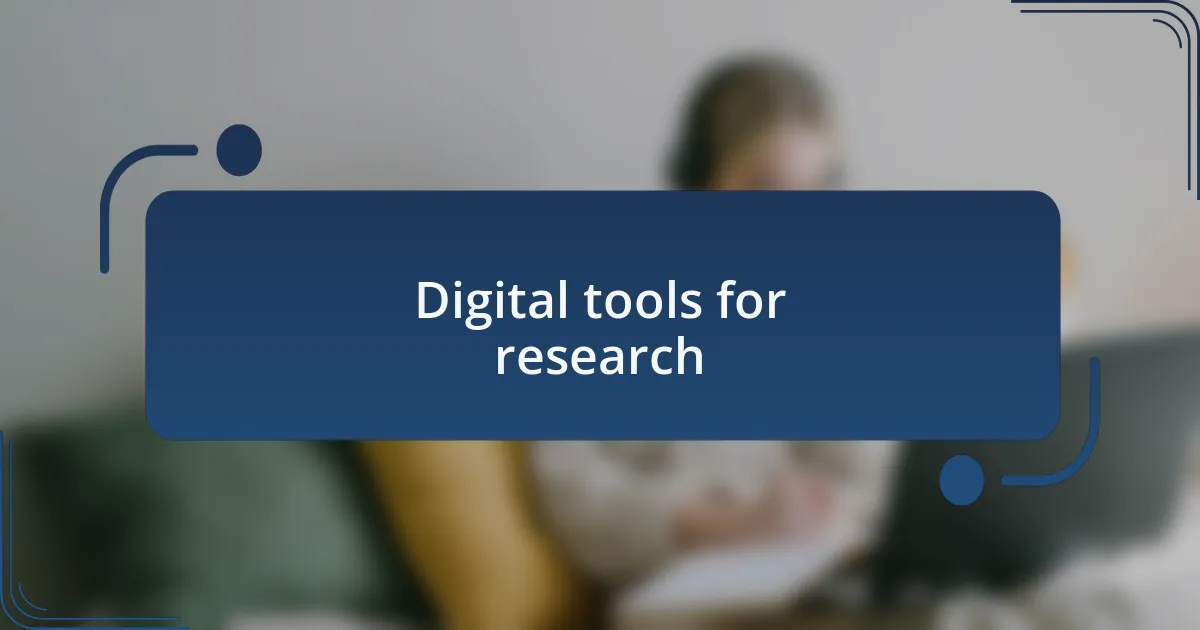
Digital tools for research
Digital tools play a crucial role in my research process, particularly when it comes to organizing vast amounts of information. For example, I frequently use reference management software like Zotero. I still vividly recall the time I lost track of sources while writing a paper. Since incorporating Zotero into my workflow, I’ve saved countless hours—no more frantic searches for that one elusive article! Isn’t it refreshing to have everything in one place?
When it comes to collaboration, tools like Google Docs have transformed the way I share ideas. I remember working on a group project where we had members spread across different continents. The real-time editing feature allowed us to build on each other’s insights almost effortlessly, creating a sense of teamwork that transcended physical distances. Have you experienced that magical synergy during a collaborative effort?
Lastly, I find that visualization tools, such as Tableau, really enhance the storytelling aspect of my research. I once created an interactive dashboard that allowed viewers to explore data on communication trends dynamically. The feedback I received was incredible; people were not just looking at numbers anymore, they were engaging with the data. Isn’t it fascinating how a visual representation can spark a deeper understanding?
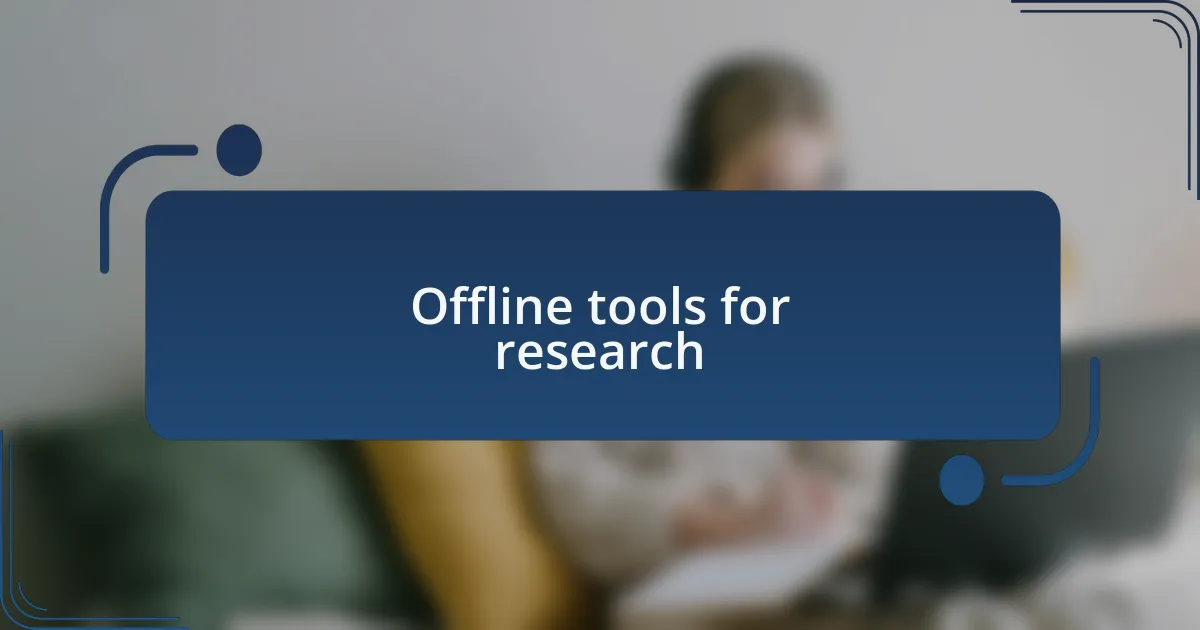
Offline tools for research
Offline research tools might seem old-fashioned, but I find them just as valuable today. For instance, visiting the library can be a grounding experience. One time, I spent hours pouring over physical books and journals, surrounded by that unique quiet hum of knowledge. In that moment, I felt a connection to the past researchers who had studied similar topics. Isn’t it interesting how being in a physical space dedicated to learning can spark creativity?
Another tool I rely on is handwritten notes. I keep a journal specifically for my research thoughts, and I cannot emphasize enough how this practice clears my mind. Each time I jot down an idea, I feel a sense of clarity wash over me. Plus, when I look back weeks later, those notes remind me of the thought process I had at that moment. There’s something intimate about pen and paper that digital devices just can’t replicate, wouldn’t you agree?
Lastly, attending workshops or seminars has become a crucial part of my offline research toolkit. I vividly recall an inspiring workshop on communication techniques that completely changed my perspective. The in-person interactions and exchanges of thoughts with fellow attendees created a wealth of ideas that no online forum could offer. Have you ever left a workshop feeling energized and filled with new insights? Those moments of connection are invaluable in my research journey.
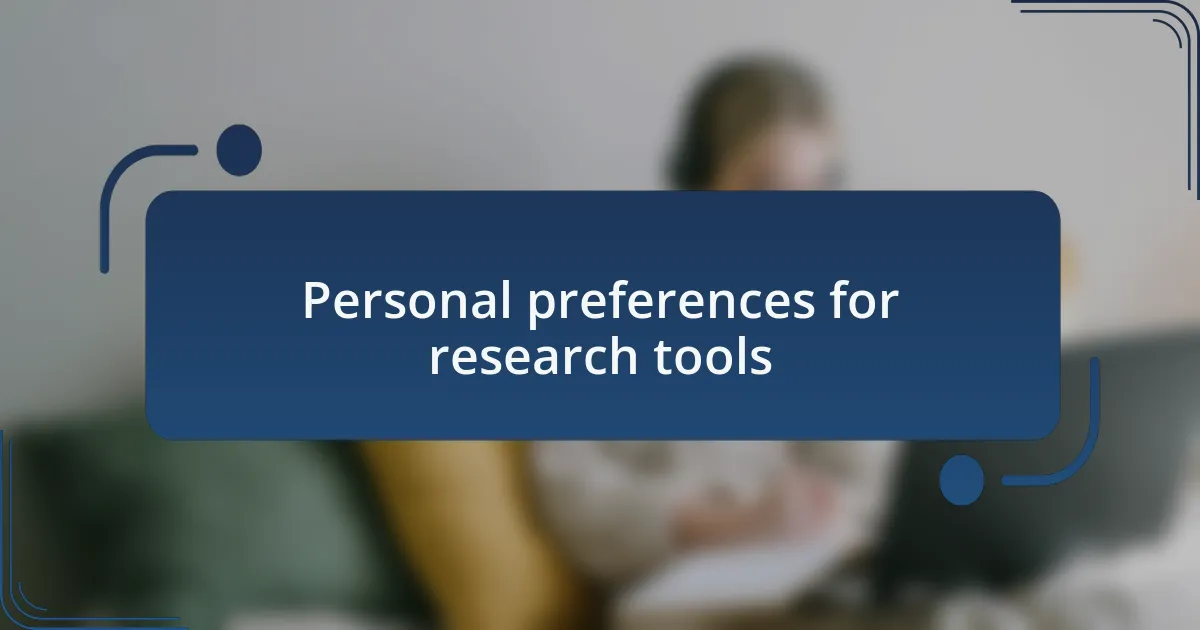
Personal preferences for research tools
When it comes to online research tools, I find myself gravitating towards academic databases. These resources allow me to access peer-reviewed articles and reputable journals that enhance my understanding of a topic. I remember the day I unearthed a groundbreaking study through an online database; it felt like discovering hidden treasure that significantly enriched my research. Have you ever had that exhilarating moment of stumbling upon the perfect source? It’s a game changer.
Another essential tool I lean on is productivity apps. I absolutely love using mind mapping software when I brainstorm new ideas. There’s something about visually organizing my thoughts that makes complex topics more manageable. Just last week, while exploring a new communication strategy, I was able to see connections between concepts that I hadn’t considered before. Do you ever feel overwhelmed by a multitude of ideas? This approach helps me sort through the chaos.
Lastly, I make a point to follow experts in my field on social media. I often engage with their posts, which opens up opportunities for discussions and insights I might not have encountered otherwise. Just last month, I participated in a Twitter chat that highlighted innovative communication practices. The exchange of perspectives left me with fresh ideas that I couldn’t wait to incorporate into my work. Isn’t it fascinating how a quick interaction online can expand your research horizon?